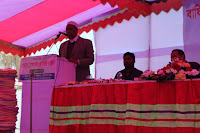
Are You a Non-Native English Speaker?
Interested in Improving Your Communication Skills and Understanding Role of Media in Society?
Free online course offered by American English E-Teacher Program
Enroll now and complete course work by July 27, 2020
Enroll now and complete course work by July 27, 2020
DHAKA, December 18, 2019 – The course provides an opportunity to develop a broader understanding of the role media plays in our lives while building the vocabulary and language skills needed to analyze what we read and watch. This course was developed by the University of Pennsylvania and adapted by FHI 360 for the American English (AE) E-Teacher Program, a program sponsored by the U.S. Department of State.
Enrollment is currently open. After enrolling, participants may log in at any time — day or night — to access the course. All six modules of coursework must be completed by July 27, 2020. Participants who complete the required activities with a score of 70% or higher will receive a digital badge and certificate. This English for Media Literacy MOOC is designed for non-native English speakers who are interested in improving their language skills and knowledge of the media at the same time. In this course, participants will investigate how media has changed over time. They will explore the world of advertising and identify targeted marketing strategies, analyze sources and detect bias, and examine how diversity representation in media influences individual identity and society. Through weekly participation in this MOOC, participants will have the opportunity to share ideas with peers and apply course content to their specific learning environment.
Get ready to learn about media through an English medium and be part of an international learning community with learners around the world! All created content in this course is licensed CC-BY 4.0. This means that anything marked CC BY 4.0 can be reused, revised, remixed, and redistributed by teachers in their school or community.
This special English for Media Literacy MOOC is one of many initiatives the U.S. Diplomatic Mission in Bangladesh is supporting this year to promote greater cooperation, dialogue, and mutual understanding between Bangladeshis and Americans.
To enroll in the course, visit the following website:
For more information about other MOOCs offered through the U.S. Department of State’s American English (AE) E-Teacher Program, please visit: https://www.aeeteacher.org/node/273.
=======================
আপনার মাতৃভাষা কী ইংরেজি ছাড়া অন্য কোনো কিছু?
ইংরেজিতে যোগাযোগের দক্ষতা বাড়াতে পেশাদার উন্নতির সুযোগ গ্রহণ করতে চান?
আমেরিকান ইংলিশ ই–টিচার কর্মসূচির আওতায় বিনামূল্যে অনলাইন কোর্সে অংশ নিন
এখনই নাম তালিকাভুক্ত করুন। কোর্স শেষ করুন ২৭ জুলাই, ২০২০ এর মধ্যে
এখনই নাম তালিকাভুক্ত করুন। কোর্স শেষ করুন ২৭ জুলাই, ২০২০ এর মধ্যে
ঢাকা, ১৮ ডিসেম্বর, ২০১৯ — ইংরেজি যাদের মাতৃভাষা নয় এবং যারা ভাষাগত দক্ষতাবৃদ্ধি ও একইসঙ্গে মিডিয়া সম্পর্কে আরও জানতে আগ্রহী তাদের জন্য বিনামূল্যে ‘ম্যাসিভ অনলাইন ওপেন কোর্স’ (এমওওসি) আয়োজন করেছে যুক্তরাষ্ট্রের পররাষ্ট্র দফতর। কোর্সটি মিডিয়া আমাদের জীবনে কী ভূমিকা রাখে তা আরও ভালোভাবে বোঝার সুযোগ করে দেওয়ার পাশাপাশি আমরা মিডিয়ায় যা পড়ি ও দেখি তা বিশ্লেষণের জন্য প্রয়োজনীয় শব্দভাণ্ডার এবং ভাষাগত দক্ষতা তৈরিতে সহায়তা করবে। পেনসিলভেনিয়া বিশ্ববিদ্যালয় এই কোর্সটি তৈরি করেছে। কোর্সটিকে পররাষ্ট্র দপ্তরের পৃষ্ঠপোষকতায় আয়োজিত আমেরিকান ইংলিশ (এই) ই-টিচার কর্মসূচির জন্য উপযোগী করে গড়ে তুলেছে অলাভজনক মানব উন্নয়ন বিষয়ক সংগঠন এফএইচআই ৩৬০।
বর্তমানে অনলাইন কোর্সটিতে তালিকাভুক্তি চলছে। তালিকাভুক্তির পরে অংশগ্রহণকারীরা কোর্সটিতে অংশ নিতে যেকোন সময় (দিন বা রাত) লগ ইন করতে পারবেন। কোর্সের ছয়টি মডিউল অবশ্যই জুলাই ২৭, ২০২০ এর মধ্যে শেষ করতে হবে। ৭০% বা তার বেশি স্কোরসহ প্রয়োজনীয় কার্যক্রম সম্পন্নকারীরা পাবেন একটি ডিজিটাল ব্যাজ এবং সনদপত্র।
মিডিয়া সাক্ষরতার জন্য ইংরেজি শিক্ষার এই অনলাইন কোর্সটি তাদের জন্যই তৈরি করা হয়েছে যাদের মাতৃভাষা ইংরেজি নয় ও যারা একই সঙ্গে ইংরেজিতে দক্ষতা এবং মিডিয়া বিষয়ক জ্ঞান বৃদ্ধিতে আগ্রহী। এই কোর্সে অংশগ্রহণকারীরা সময়ের সঙ্গে সঙ্গে মিডিয়া কীভাবে বদলে গেছে তা খতিয়ে দেখবেন। তারা বিজ্ঞাপনের জগত সম্পকের্ও ধারণা নেবেন। অংশ নেবেন লক্ষ্যভিত্তিক বিপণন কৌশল চিহ্নিতকরণ, উৎস বিশ্লেষণ এবং পক্ষপাত সনাক্তকরণের মতো কার্যক্রমে। মিডিয়ায় বৈচিত্রের প্রতিনিধিত্ব কীভাবে ব্যক্তি পরিচয় এবং সমাজকে প্রভাবিত করে তা-ও খতিয়ে দেখবেন। এই এমওওসি-তে সাপ্তাহিক ভিত্তিতে যোগ দেওয়ার মাধ্যমে অংশগ্রহণকারীরা তাদের শ্রেণিপেশার অন্যদের সঙ্গে ধারণা ভাগাভাগি করে নেওয়ার সুযোগ পাবেন। কোর্সের বিষয়গুলোকে তাদের নিজ নিজ বিশেষ শিক্ষাপরিবেশে প্রয়োগ করতেও শিখবেন তারা।
তাহলে ইংরেজি মাধ্যমে মিডিয়া সম্পর্কে আরও অনেক কিছু জেনে নিন। যোগ দিন বিশ্বজুড়ে ছড়িয়ে থাকা শিক্ষার্থীদের এক আন্তর্জাতিক গোষ্ঠীতে! প্রসঙ্গত, এই কোর্সের জন্য তৈরি করা সব উপকরণ সিসি-বিওয়াই ৪.০ হিসেবে লাইসেন্সকৃত। এর অর্থ হচ্ছে, সংশ্লিষ্ট শিক্ষকরা সিসি-বিওয়াই ৪.০ চিহ্নিত যে কোনও শিখন উপকরণ তাদের স্কুল বা এলাকায় পুনরায় ব্যবহার, পরিমার্জন, রদবদল এবং বিতরণ করতে পারবেন।
বাংলাদেশ এবং যুক্তরাষ্ট্রের জনগণের মধ্যে সহযোগিতা, সংলাপ এবং পারস্পরিক বোঝাপড়াকে আরও এগিয়ে নিতে চলতি বছর যুক্তরাষ্ট্রের স্থানীয় কূটনৈতিক মিশন যে বিভিন্ন উদ্যোগ নিয়েছে মিডিয়া সাক্ষরতার জন্য ইংরেজি শিক্ষার এই বিশেষ অনলাইন কোর্সটি (এমওওসি) তার অন্যতম।
কোর্সে ভর্তির জন্য নিম্নলিখিত ওয়েবসাইটে যান: https://www.canvas.net/browse/fhi/courses/english-for-media-literacy
যুক্তরাষ্ট্রের পররাষ্ট্র দফতরের আমেরিকান ইংলিশ (এই) ই-টিচার কর্মসূচির মাধ্যমে আয়োজিত অন্যান্য এমওওসি সম্পর্কে আরও তথ্যের জন্য অনুগ্রহ করে এখানে যান: https://www.aeeteacher.org/node/273.
=======================


 তিনজন ফেডারেল কৌসুলি, যুক্তরাজ্যের একজন ফৌজদারি বিচার বিষয়ক উপদেষ্টা এবং ঢাকা বিশ্ববিদ্যালয়ের একজন আইনের অধ্যাপক। বিশেষ পরিস্থিতিতে বর্তমানে ডিজিটাল সাক্ষ্যপ্রমাণ অনুমোদিত এমন কিছু ট্রাইব্যুনাল থেকে আমন্ত্রিতরা এ কর্মশালায় অংশগ্রহণ করছেন। এর মধ্যে রয়েছে সন্ত্রাসবিরোধী ট্রাইব্যুনাল, সাইবার ক্রাইম ট্রাইব্যুনাল, দ্রুত বিচার ট্রাইব্যুনাল এবং পরিকল্পনাধীন মানবপাচার বিরোধী ট্রাইব্যুনাল। আদালতে ডিজিটাল সাক্ষ্যপ্রমাণ ব্যবহারের ক্ষেত্রে ১৮৭২ সালের সাক্ষ্য আইন অনুযায়ী বিচারক ও কৌসুলিরা যেসব সমস্যার মুখোমুখি হন সেগুলো সম্পর্কে পরিস্কার ধারণা পেতে আইন, বিচার ও সংসদ বিষয়ক মন্ত্রণালয়ের প্রতিনিধিরাও এতে আমন্ত্রিত হয়েছেন।
তিনজন ফেডারেল কৌসুলি, যুক্তরাজ্যের একজন ফৌজদারি বিচার বিষয়ক উপদেষ্টা এবং ঢাকা বিশ্ববিদ্যালয়ের একজন আইনের অধ্যাপক। বিশেষ পরিস্থিতিতে বর্তমানে ডিজিটাল সাক্ষ্যপ্রমাণ অনুমোদিত এমন কিছু ট্রাইব্যুনাল থেকে আমন্ত্রিতরা এ কর্মশালায় অংশগ্রহণ করছেন। এর মধ্যে রয়েছে সন্ত্রাসবিরোধী ট্রাইব্যুনাল, সাইবার ক্রাইম ট্রাইব্যুনাল, দ্রুত বিচার ট্রাইব্যুনাল এবং পরিকল্পনাধীন মানবপাচার বিরোধী ট্রাইব্যুনাল। আদালতে ডিজিটাল সাক্ষ্যপ্রমাণ ব্যবহারের ক্ষেত্রে ১৮৭২ সালের সাক্ষ্য আইন অনুযায়ী বিচারক ও কৌসুলিরা যেসব সমস্যার মুখোমুখি হন সেগুলো সম্পর্কে পরিস্কার ধারণা পেতে আইন, বিচার ও সংসদ বিষয়ক মন্ত্রণালয়ের প্রতিনিধিরাও এতে আমন্ত্রিত হয়েছেন।




